Review: ‘Filipino soul food’ finds a home at this casual Long Beach restaurant
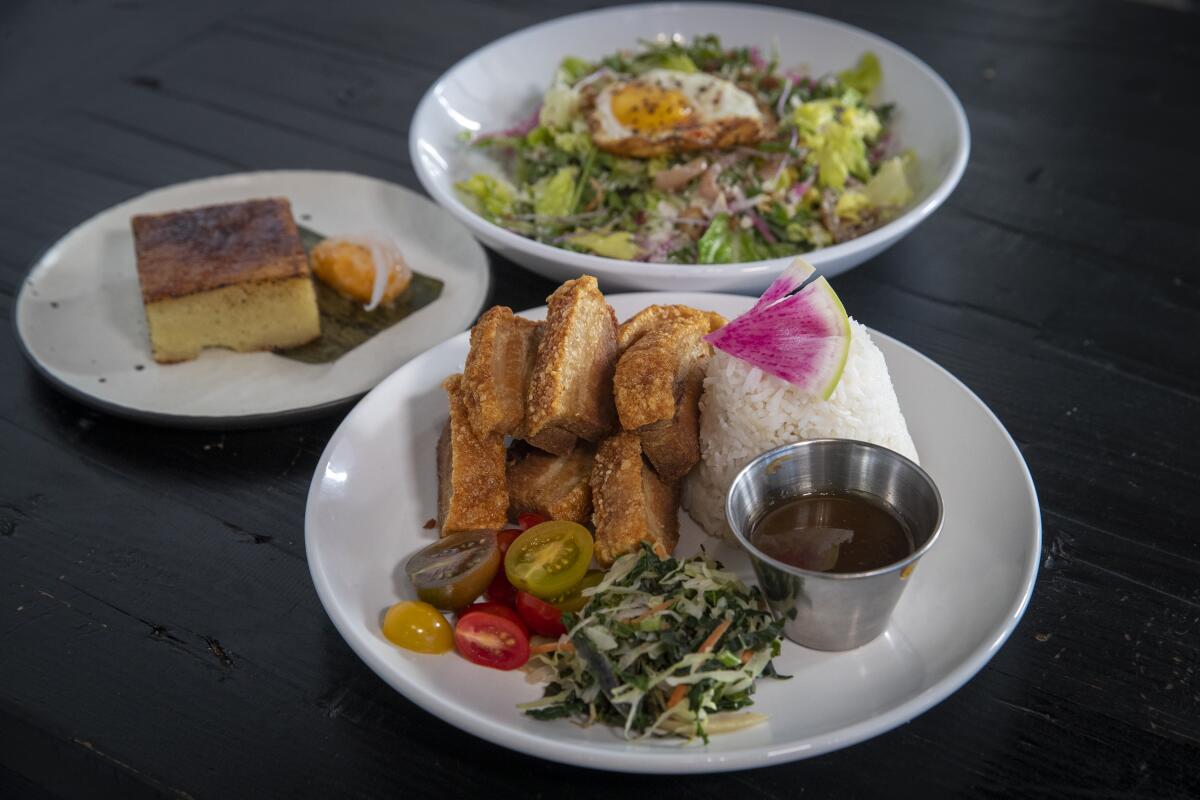
- Share via
At Bebot Filipino Soul Food in Long Beach, chef AC Boral’s brunch menu includes Scotch eggs swaddled in longanisa sausage; bright purple ube-mochi waffles brushed with butter and coconut jam; and a halo-halo-inspired breakfast parfait made from Greek yogurt layered with gemstones of varicolored jellies, jams and fruit-flavored flan.
Together, the dishes are a still life of saturated color, the kind of photogenic cooking that pops on Instagram, but the reality is even more vivid. The Scotch eggs have a salty crispiness that gives way to the delicate flesh of the egg. The waffles, earthy and sweet, are dense yet miraculously elastic. The halo-halo parfait is luxuriously creamy and fruity, more nourishing than indulgent.
A member of Boral’s family recently described these dishes as “millennial Filipino food,” a catchy label that he says captures the spirit and youthfulness of his first-generation, Filipino American cooking.
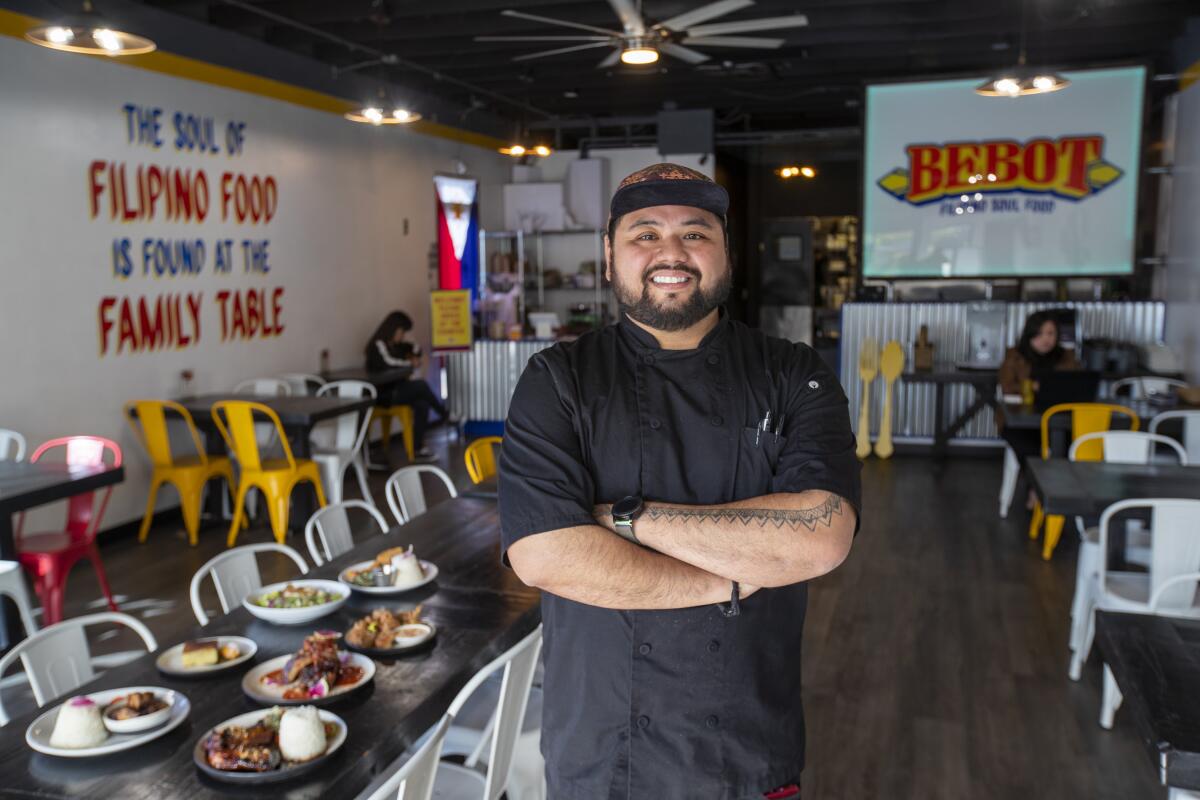
But he prefers to call it “Filipino soul food” — cooking grounded in the foods he grew up eating around the family table, channeled through the sensibilities of a self-taught chef with a predilection for big, bombastic flavors.
In the years before Bebot (the word is Tagalog slang for “babe” or “chick”), Boral, who operates the restaurant with his mother, Rose, started serving Filipino-inspired brunch dishes as part of a roving pop-up project called Rice & Shine. After years of peripatetic pop-up cooking — including hosting elaborate, family-style Kamayan dinners, a 36-course dinner series inspired by the music of the Wu-Tang Clan, and a short-term takeover of Charles Olalia’s Rice Bar in downtown L.A. — Boral settled into a light-filled, 40-seat storefront at the edge of Long Beach’s 4th Street Corridor in August.
Long wooden tables run down the middle of the minimally decorated counter-service restaurant, which is accented with the blue, red and bright yellow of the Philippine national flag. The daily changing menu is divided into “new school” and “old school” sections, a bifurcation that reflects dueling impulses: the desire to pay tribute to traditional Filipino cooking and a restive need for creative expression.
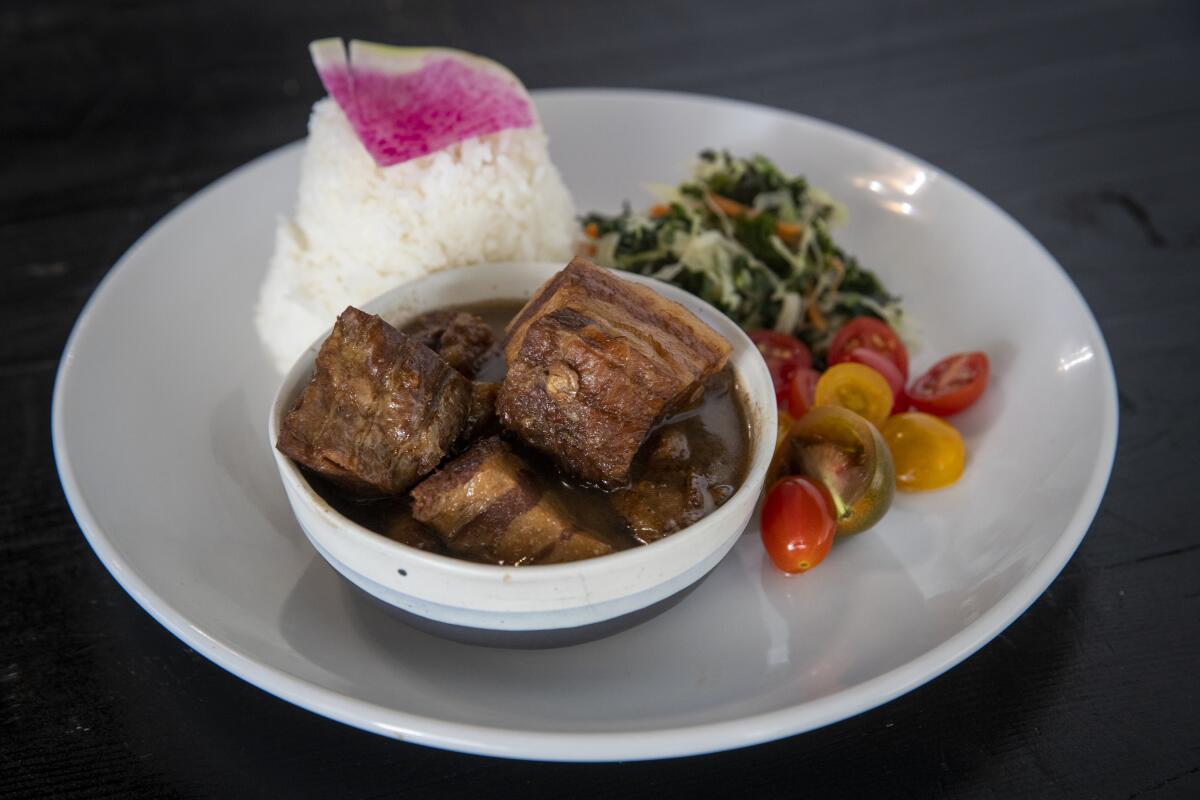
Many of the most compelling dishes are on the “new school” side of the menu. Sinigang lumpia, Boral’s take on the sweet-sour Filipino stew, is re-imagined as a crisp, cigar-shaped roll filled with minced pork, rice and vegetables. Each bite, irreproachably crunchy, delivers a fresh jolt of citrus and tamarind.
Pancit, the classic Filipino stir-fried noodle dish, is re-created as a creamy, carbonara-like wheat noodle dish spiked with shrimp, salty nubs of Spam and chile flakes sprinkled on top like glitter. A vegan version boosted with citrus, soy and mushrooms achieves deep, concentrated umami flavor.
One of the cleverest and most delicious dishes is on the ever-changing dessert menu: a nutty, rich and elegant bibingka brûlée. The rice cake is traditionally cooked in banana leaves over coals; Boral torches his version and serves it thatched with slightly gritty ensaymada butter — bits of cheese, granulated sugar and butter blended into an irresistibly rich topping.
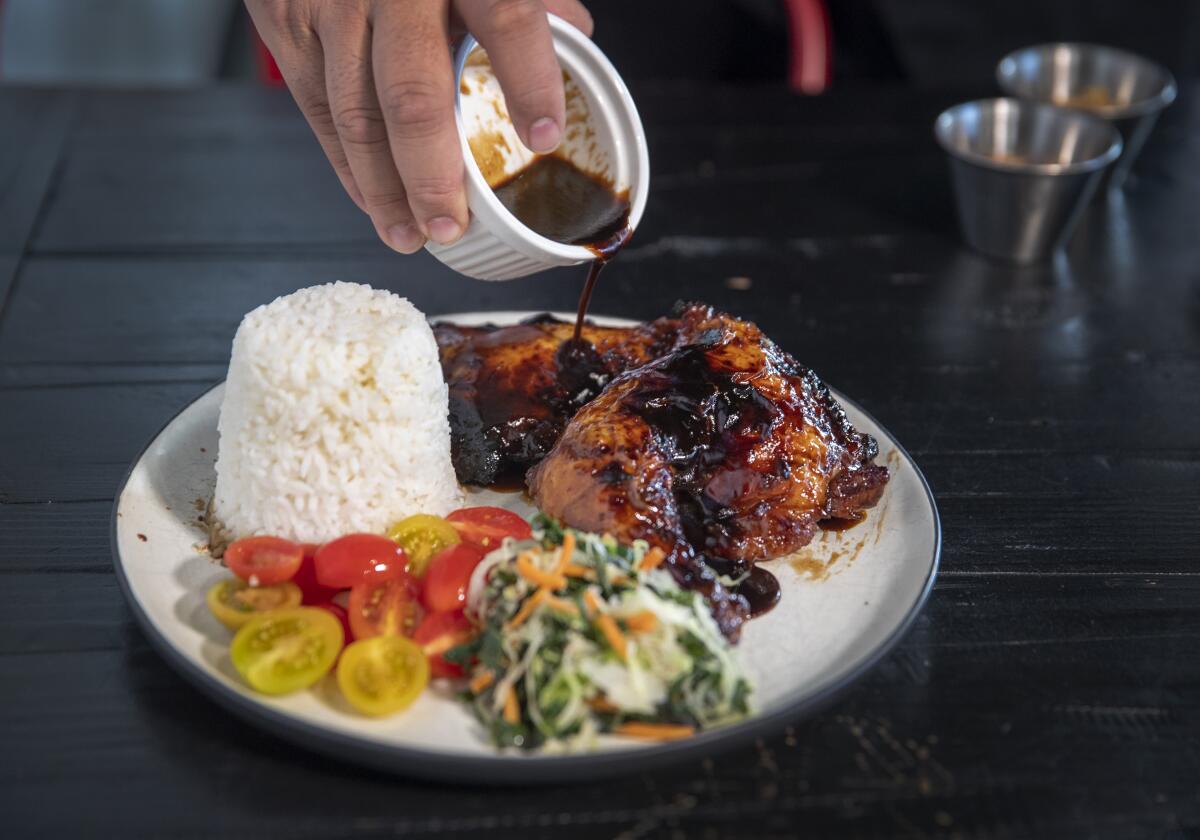
Pork is celebrated in dish after dish, particularly on the “old school” side of the menu. Twice-cooked pork belly adobo is a triumph of voluptuousness; the meat is roasted, then braised in a coconutty broth full of creaminess and depth. Lechon kawali — salty, ultra-fatty morsels of pork belly — have thin, crackly edges, primed to shatter.
Boral’s father, who died several years ago, inspired the excellent barbecued chicken, exalted in a glossy soy-garlic marinade and served with a tower of white rice and a side of greens. The flavors are familiar yet vivid, the skin mottled with smoky char around the edges from where it sat on the grill, each bite effusing animal salt and juice. Plump, elaborately seasoned chicken tocino bites (inspired in part by Japanese fried chicken) is a similarly comforting dish.
The casual, comforting pulse of the menu — tied together by vivid ingredients and a rich sense of culinary imagination — is bound up in personal history, heritage and identity.
Filipino cooking, with its centuries-long intermingling of Eastern and Western traditions and its legacy of colonialism, is something Boral thinks about a lot.
“Filipino food tradition has a dark history,” he said.
“What I’m trying to do here is a tribute to Filipino food. It’s about honoring my parents, my grandparents and my ancestors because without them, I’m not here.”
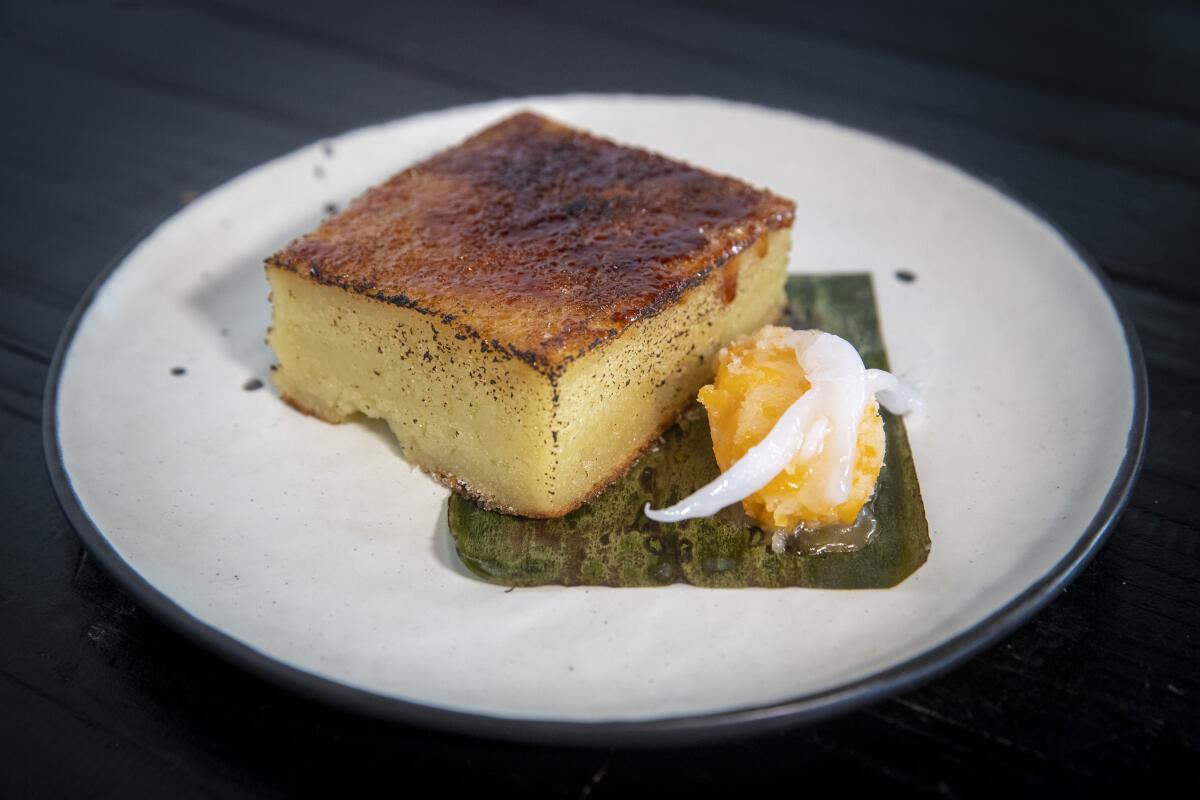
Bebot Filipino Soul Food
Location: 2741 E. 4th St., Suite A, Long Beach, (562) 342-6008, bebotfilipinosoulfood.com
Details: Credit cards accepted. Beer and wine only. Lot and street parking. Wheelchair accessible.
Prices: “Old school” dishes $11-$14, “new school” dishes $5-$18, matamis (sweets) $5
Recommended dishes: Chicken tocino bites, twice-cooked pork belly adobo, Dad’s glazed BBQ chicken, bibingka brûlée
More to Read
Eat your way across L.A.
Get our weekly Tasting Notes newsletter for reviews, news and more.
You may occasionally receive promotional content from the Los Angeles Times.










